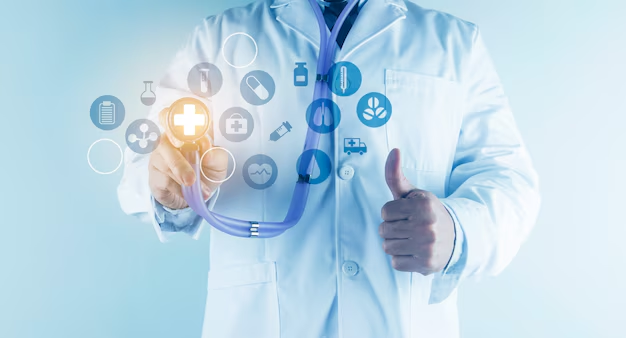In recent years, technology has transformed the way healthcare is delivered and managed. With the rise of digital tools, health management has become more efficient, accessible, and personalized than ever before. From telemedicine and wearable health devices to artificial intelligence (AI) and electronic health records (EHR), technology is playing a pivotal role in improving patient care, streamlining healthcare processes, and enabling people to take control of their own health. In this article, we will explore how technology is shaping modern health management and its impact on both healthcare providers and patients.
1. Telemedicine and Virtual Healthcare
One of the most significant technological advancements in modern health management is telemedicine. Telemedicine refers to the use of telecommunications technology to provide healthcare services remotely. Through video calls, phone consultations, and messaging, patients can receive care without needing to physically visit a doctor’s office or hospital.
Benefits of Telemedicine:
- Increased Access to Care: Telemedicine makes healthcare accessible to people living in rural or underserved areas who might otherwise have limited access to medical professionals.
- Convenience: Patients can consult with healthcare providers from the comfort of their homes, saving time and money spent on travel.
- Timely Care: Telemedicine enables quicker consultations, which can be especially important for non-emergency medical issues, follow-up care, or mental health services.
- Reduced Healthcare Costs: With virtual visits, healthcare providers can streamline operations, leading to cost savings for both patients and providers.
Telemedicine has grown rapidly, especially during the COVID-19 pandemic, and has paved the way for long-term changes in healthcare delivery.
2. Wearable Health Devices and Monitoring Tools
Wearable devices, such as smartwatches and fitness trackers, have become an integral part of modern health management. These devices continuously monitor various health parameters, including heart rate, sleep patterns, physical activity, and even blood oxygen levels. Some advanced wearables, like the Apple Watch or Fitbit, are capable of tracking ECG readings, detecting irregular heart rhythms, and alerting users to potential health issues.
Key Benefits of Wearables:
- Continuous Monitoring: Wearables provide real-time insights into a person’s health, allowing them to track their progress and detect issues early on.
- Personalized Health Data: Users can tailor their health routines based on data, improving overall wellness, fitness, and mental health.
- Proactive Health Management: Wearable devices can send alerts for abnormal readings, allowing users to seek medical attention before a condition worsens. For example, wearables can detect abnormal heart rhythms or high blood pressure.
- Integration with Healthcare Providers: Many wearables are compatible with health apps that sync data with electronic health records (EHRs), enabling healthcare providers to remotely monitor patients and make informed decisions.
These devices encourage individuals to take a more active role in their health and can help manage chronic conditions, such as diabetes or hypertension, with continuous monitoring and data collection.
3. Artificial Intelligence (AI) and Machine Learning
Artificial intelligence (AI) and machine learning are revolutionizing how healthcare providers diagnose and treat patients. AI-driven tools can analyze vast amounts of medical data, including lab results, imaging, and patient history, to identify patterns and assist doctors in making more accurate diagnoses.
Applications of AI in Healthcare:
- Diagnostic Tools: AI can analyze medical images, such as X-rays, MRIs, and CT scans, to detect signs of diseases like cancer, heart conditions, or neurological disorders with remarkable accuracy.
- Predictive Analytics: AI algorithms can predict the likelihood of certain health conditions based on a patient’s data, helping healthcare providers make proactive decisions and provide preventative care.
- Virtual Assistants and Chatbots: AI-powered virtual assistants can help manage appointments, answer medical queries, and even provide basic health advice. These tools can reduce the workload on healthcare staff and make healthcare services more accessible.
- Personalized Treatment Plans: AI can analyze genetic data and personal health history to create tailored treatment plans for patients, ensuring they receive the most effective care.
By leveraging AI and machine learning, healthcare professionals can improve the precision of diagnoses, reduce errors, and enhance overall treatment outcomes.
4. Electronic Health Records (EHR) and Health Information Systems
The transition from paper-based to electronic health records (EHRs) has been one of the most important technological advancements in modern healthcare management. EHRs allow for the digital storage, retrieval, and sharing of patient information, ensuring healthcare providers have quick access to accurate, up-to-date medical histories.
Benefits of EHRs:
- Improved Patient Care: EHRs provide a comprehensive and accessible view of a patient’s medical history, allowing healthcare providers to make better-informed decisions.
- Better Coordination Between Providers: EHRs allow various healthcare professionals—doctors, nurses, specialists, and pharmacists—to share patient data, leading to more coordinated care.
- Reduced Errors and Redundancies: With digital records, the chances of medical errors due to misplaced files, illegible handwriting, or missing information are minimized. It also reduces the need for duplicate tests or procedures.
- Patient Engagement: Many EHR systems allow patients to access their own records, schedule appointments, request prescriptions, and communicate with their healthcare providers through online portals.
EHRs have significantly improved healthcare efficiency, helping to streamline administrative tasks and reduce the time doctors and nurses spend on paperwork.
5. Health Apps and Mobile Health (mHealth)
Health apps have become a key component of modern health management. From fitness and nutrition trackers to apps that manage chronic conditions like diabetes or asthma, mobile health (mHealth) allows patients to monitor their health and stay informed about their progress.
Types of Health Apps:
- Fitness and Activity Tracking Apps: Apps like MyFitnessPal or Strava track physical activity, diet, and exercise to help users stay healthy.
- Chronic Disease Management Apps: Apps specifically designed for people with chronic conditions, such as diabetes management apps, enable users to track symptoms, medication, and lifestyle changes.
- Mental Health Apps: Apps like Calm, Headspace, or Talkspace provide tools for meditation, stress management, and virtual therapy sessions, promoting mental well-being.
Mobile health apps empower individuals to take a more active role in managing their health. These apps help users track their habits, access educational resources, and connect with healthcare providers as needed.
6. Blockchain Technology in Healthcare
While blockchain technology is most commonly associated with cryptocurrencies like Bitcoin, it also holds significant promise for healthcare management. Blockchain can offer secure, decentralized storage of health data, ensuring that patient information is protected from breaches and unauthorized access.
Benefits of Blockchain in Healthcare:
- Data Security: Blockchain’s encryption and decentralized nature make it a robust solution for protecting sensitive patient data, such as personal health records.
- Interoperability: Blockchain can facilitate the sharing of health data between different healthcare systems while maintaining security and privacy.
- Transparency and Traceability: Blockchain ensures that healthcare transactions and data exchanges are transparent and traceable, improving accountability and reducing fraud.
Blockchain technology can transform the healthcare sector by providing a more secure, transparent, and efficient way of managing patient data and healthcare transactions.
7. Big Data and Analytics in Healthcare
The healthcare industry generates vast amounts of data every day. Big data analytics allows healthcare providers to analyze this data and extract valuable insights that can improve patient outcomes and healthcare processes.
Uses of Big Data in Health Management:
- Population Health Management: By analyzing data from large groups of patients, healthcare providers can identify trends, such as the prevalence of certain conditions, and develop preventative strategies.
- Treatment Optimization: Big data can help doctors determine which treatments are most effective for specific patient populations, improving the quality of care.
- Cost Reduction: Analyzing healthcare data can identify inefficiencies in care delivery, helping providers reduce unnecessary tests or procedures, thus lowering overall healthcare costs.
Big data is essential for making informed decisions and optimizing both clinical and administrative aspects of healthcare.
8. The Future of Technology in Health Management
The role of technology in health management is likely to continue evolving as innovations such as robotic surgery, gene editing, and 3D printing revolutionize the industry. As technology continues to advance, we can expect even greater improvements in personalized healthcare, patient outcomes, and healthcare accessibility.
The integration of technology in healthcare is moving toward precision medicine, where treatments and interventions are tailored to the individual patient based on their unique genetic makeup, lifestyle, and health data. Additionally, the increased use of artificial intelligence and machine learning will continue to enhance diagnostic accuracy, streamline administrative tasks, and improve treatment outcomes.
9. Challenges and Considerations
Despite the promising potential of technology in health management, there are challenges to address:
- Privacy and Data Security: As more health data is collected and shared, ensuring patient privacy and protecting sensitive information from cyberattacks are critical concerns.
- Digital Divide: Not all populations have equal access to the internet or the latest technology, which could exacerbate health disparities.
- Regulation and Standardization: The rapid pace of technological innovation requires regulators to establish clear guidelines and standards to ensure the safety, efficacy, and interoperability of new health technologies.
10. Conclusion
Technology is reshaping modern health management in profound ways, improving access to care, enhancing patient outcomes, and enabling more personalized, efficient, and cost-effective healthcare. From telemedicine and wearables to AI and blockchain, innovations in technology are transforming the healthcare landscape, offering new opportunities to manage health and wellness more effectively. However, to fully realize the potential of these technologies, it is crucial to address issues such as data privacy, digital equity, and regulatory challenges. As technology continues to evolve, the future of healthcare looks promising, with more opportunities to improve the quality of life for individuals and the efficiency of healthcare systems worldwide.

